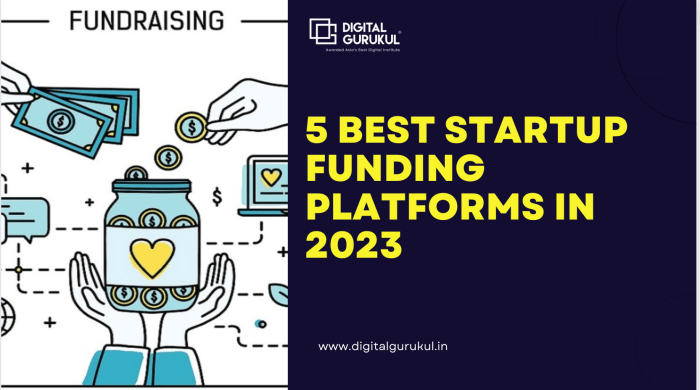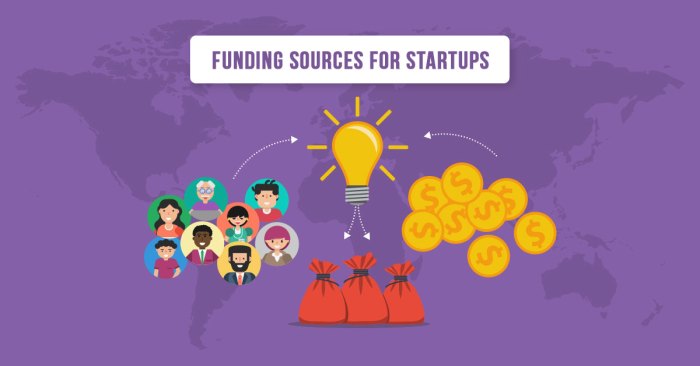
Exploring the world of Best startup funding sources, this introduction sets the stage for a deep dive into the various funding options available to new businesses. From angel investors to venture capital, this guide covers it all in a engaging and informative manner.
STARTUP FUNDING

Startup funding refers to the financial support that new businesses require to launch, operate, and grow. Securing funding is crucial for startups as it helps cover initial expenses, such as product development, marketing, hiring employees, and scaling operations. Without adequate funding, startups may struggle to survive and reach their full potential.
Common Startup Funding Sources
- Bootstrapping: This involves using personal savings, credit cards, or loans from friends and family to fund the startup.
- Angel Investors: High-net-worth individuals who provide capital in exchange for ownership equity or convertible debt.
- Venture Capital: Investment firms that provide funding to startups in exchange for equity stakes.
- Crowdfunding: Platforms where individuals can invest small amounts of money in startups in exchange for rewards or equity.
- Bank Loans: Traditional loans from financial institutions that must be repaid with interest.
Comparing Different Startup Funding Options
- Bootstrapping is ideal for founders who want to maintain full control over their business but may limit growth potential due to resource constraints.
- Angel investors offer mentorship and expertise in addition to funding, but they typically require a stake in the company.
- Venture capital provides large sums of money for rapid growth but involves giving up a significant portion of ownership and control.
- Crowdfunding can help startups validate their idea and build a loyal customer base, but success is not guaranteed.
- Bank loans are suitable for startups with a solid business plan and collateral but can be risky if the business fails.
ANGEL INVESTORS

Angel investors are individuals who provide financial backing to startups in exchange for ownership equity or convertible debt. They are often experienced entrepreneurs or wealthy individuals looking to invest in promising early-stage companies. Angel investors play a crucial role in the startup ecosystem by providing not just funding, but also mentorship, guidance, and valuable industry connections to help startups grow and succeed.
Advantages of Seeking Funding from Angel Investors
- Quick Decision-Making: Angel investors can often make funding decisions faster than other types of investors, allowing startups to access capital more quickly.
- Expertise and Mentorship: Angel investors typically have industry experience and can provide valuable advice and guidance to help startups navigate challenges and make strategic decisions.
- Flexible Terms: Angel investors may offer more flexible terms compared to traditional sources of funding, allowing startups to negotiate terms that are more favorable to their needs.
- Network Opportunities: Angel investors often have extensive networks that startups can tap into for partnerships, customers, and future funding opportunities.
Disadvantages of Seeking Funding from Angel Investors
- Limited Funding: Angel investors typically invest smaller amounts compared to venture capital firms, which may not be sufficient for startups with high capital needs.
- Lack of Control: Accepting funding from angel investors means giving up a portion of ownership and decision-making control in the company.
- Potential Conflicts: Differences in vision or strategy between angel investors and founders may lead to conflicts that could impact the startup’s growth and direction.
Tips for Attracting Angel Investors
- Build a Strong Network: Networking is key to connecting with potential angel investors. Attend industry events, join startup accelerators, and leverage existing connections to expand your network.
- Create a Compelling Pitch: Craft a clear and concise pitch that highlights your unique value proposition, market opportunity, and growth potential to attract angel investors’ interest.
- Show Traction: Demonstrate momentum and progress by showcasing key milestones, customer traction, revenue growth, and other metrics that validate your startup’s potential for success.
- Focus on Relationships: Building relationships with potential angel investors is crucial. Take the time to understand their investment preferences, interests, and expectations to tailor your pitch accordingly.
VENTURE CAPITAL

Venture capital funding is a type of financing provided by investors to startup companies and small businesses with long-term growth potential. Unlike traditional loans or angel investors, venture capitalists typically take an equity stake in the company in exchange for funding, offering expertise and resources in addition to financial support.
Securing Venture Capital Funding
Securing venture capital funding involves several key steps, including:
- Developing a solid business plan outlining the market opportunity, competitive landscape, and growth strategy.
- Identifying potential venture capital firms that align with the company’s industry and stage of development.
- Pitching the business to venture capitalists through presentations and meetings, highlighting the unique value proposition and growth potential.
- Negotiating deal terms, including the amount of funding, equity stake, and governance structure.
Successful Startups Funded by Venture Capitalists
- Uber: The ride-sharing giant received early funding from venture capital firm Benchmark, among others, fueling its rapid expansion into a global powerhouse.
- Airbnb: This accommodation marketplace secured funding from top venture capital firms like Sequoia Capital, enabling its growth into a hospitality industry disruptor.
- Spotify: The music streaming service raised significant capital from venture capitalists like Accel Partners, propelling its growth and market dominance in the music industry.
CROWDFUNDING
Crowdfunding is a method of raising capital through the collective effort of a large number of individuals, typically via the internet. Startups can leverage crowdfunding as a way to secure funding for their business ventures without having to rely on traditional sources like banks or venture capitalists.
Crowdfunding Platforms
- Kickstarter: One of the most popular crowdfunding platforms, Kickstarter allows startups to launch campaigns for creative projects or products. It operates on an all-or-nothing funding model, meaning projects must reach their funding goal to receive any funds.
- Indiegogo: Another well-known platform, Indiegogo offers both flexible and fixed funding options. Startups can choose to keep all funds raised even if they don’t reach their goal with the flexible funding model.
- GoFundMe: Primarily used for personal causes or charity, GoFundMe can also be used by startups to raise funds for specific projects or initiatives. It has a broad reach and is known for its ease of use.
Best Practices for Crowdfunding Campaigns
- Set a realistic funding goal: Ensure your funding target is achievable based on your network and reach.
- Create a compelling story: Engage potential backers by sharing the story behind your startup and why it matters.
- Offer attractive rewards: Provide incentives for backers to support your campaign, such as early access to products or exclusive perks.
- Promote your campaign: Utilize social media, email marketing, and other channels to spread the word about your crowdfunding campaign.
- Engage with backers: Keep your supporters updated on the progress of your campaign and show appreciation for their contributions.
In conclusion, Best startup funding sources are essential for the growth and success of any new business. By understanding the different funding options available and knowing how to attract investors, startups can pave the way for a bright future.
User Queries
What are the common startup funding sources?
Common startup funding sources include angel investors, venture capital, and crowdfunding.
How can startups attract angel investors?
Startups can attract angel investors by having a solid business plan, a strong team, and a compelling pitch.
What is the typical process of securing venture capital funding?
The typical process involves pitching to venture capitalists, due diligence, negotiations, and finally, securing the funding.
What are the best practices for running a successful crowdfunding campaign?
Best practices include setting clear goals, creating engaging content, and offering attractive rewards to backers.





